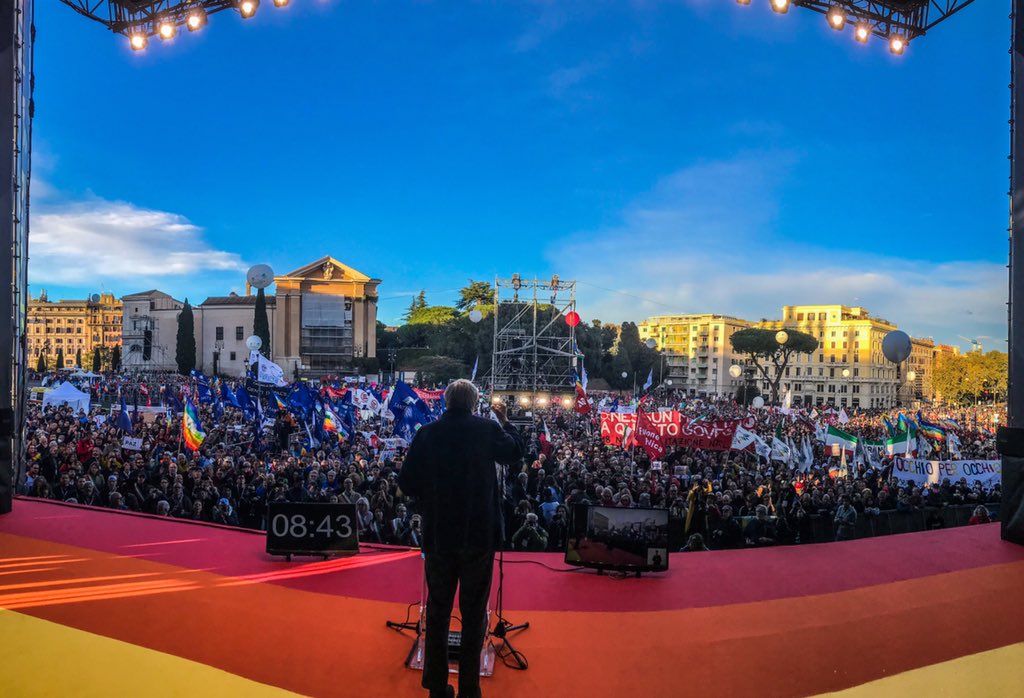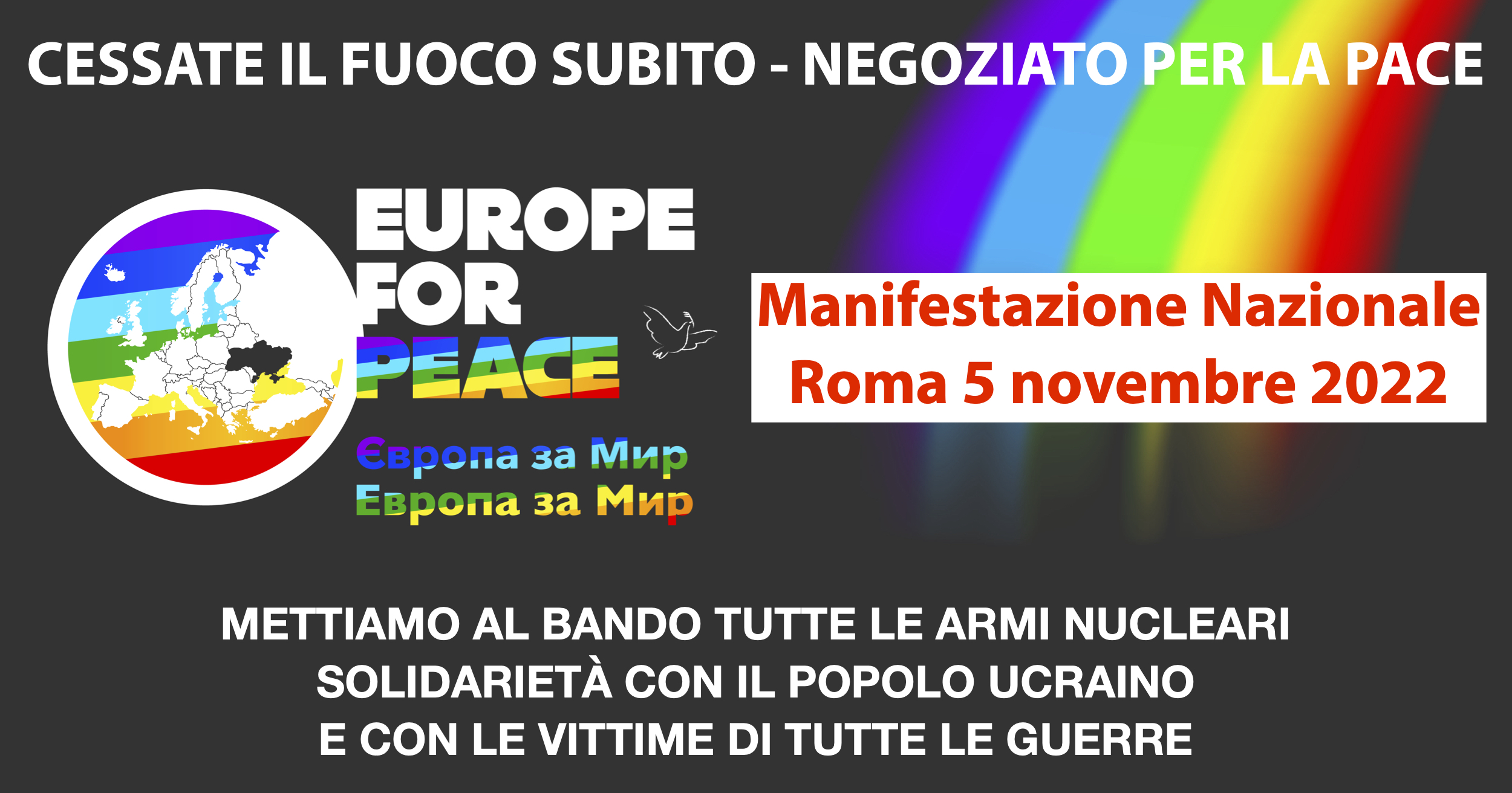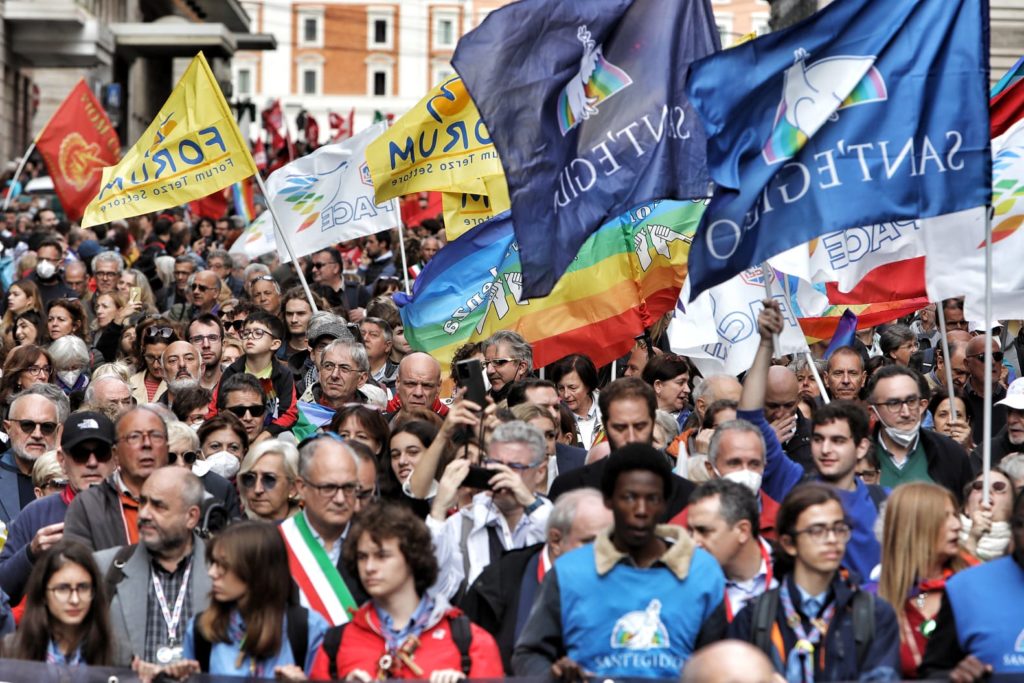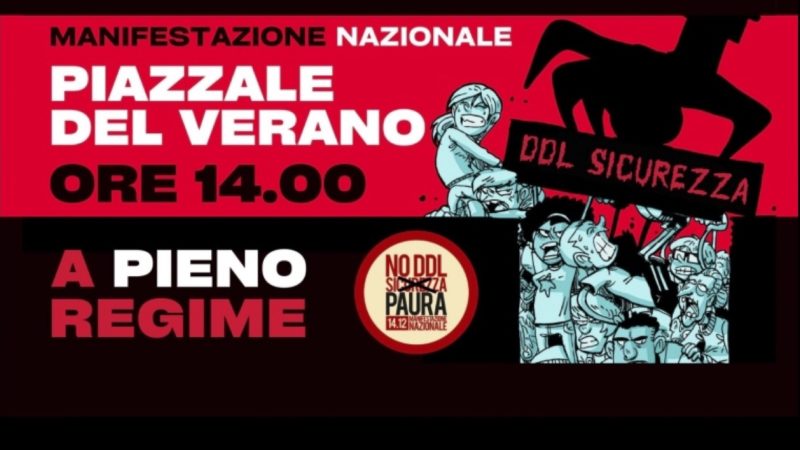Over 100.000 faces in Rome for “Europe for Peace”

The “Europe For Peace” demonstration, with a long, colourful snake winding its way from Piazza Repubblica to Piazza San Giovanni in Laterano, was a wonderful day of Peace, with a path of Nonviolence that must continue every day! For an end to the war in Ukraine and all wars in the world.
“I give you news”. Moment of suspension in Piazza San Giovanni at the first words of the last speech, that of the CGIL (national italian trade union) secretary general Maurizio Landini. “We are more than fifty!”, in obvious polemic with the so-called anti-rave decree just passed by the Meloni government. In reality, as it was announced from the stage before all the organisers gathered to sing Bella Ciao to the music of the Modena City Ramblers, the participants in the national peace demonstration that marched in Rome from Piazza della Repubblica and Via Cavour numbered over one hundred thousand (forty thousand according to the usual downward count by the Questura). To understand: at about 2.30 p.m., when the speeches on the black stage with the rainbow logo and the inscriptions in English, Russian and Ukrainian were already starting, the bulk of the procession had not yet left Piazza Esedra.

The first to speak at the microphone was Francesca Giuliani of Sbilanciamoci! -who read out the Europe for Peace platform launched by over 600 Italian associations, both lay and Catholic, who along the same lines have also organised initiatives throughout the peninsula on 23 July and the weekend between 21 and 23 October – and who together with Sergio Bassoli of the Peace and Disarmament Network presented the testimonies and speakers. This was followed by two video messages on the big screen, sent by Katrin (Katya) Cheshire – a Ukrainian pacifist – and Alexander Belik, coordinator of the Russian defectors’ movement, a refugee in Latvia. Then, in quick succession, some fifteen speakers took turns on stage to represent the vast world of associations that moved to make the national event a success.
One of the most beautiful speeches, the first after the reading of Cardinal Zuppi‘s letter to the demonstrators in Rome, was that of Raffaella Bolini of Arci, who recalled her experience in the peace movement in the 1980s, ‘when we were organising here in Italy one of the largest mobilisations in the world’, and in closing urged young people to be more committed to the issue of disarmament, ‘without which there can be no future, not even from a social and climatic point of view’. Among the testimonies was that of Nicolas Marzolino, a young victim of an unexploded ordnance and member of the National Association of Civilian War Victims: “I was injured by a bomb from World War II, which I found in my field. How long will the bombs that are being used continue to sow death? Sending weapons makes Ukrainians cannon fodder’.
Don Luigi Ciotti also wanted to link up with the great Italian pacifist movement of forty years ago and did so by recalling the words of Tonino Bello. “In 1982, a prophet, he said that he was worried about a Europe that was more and more a common coffin instead of a common home, a Europe more and more of merchants than of brothers,” Ciotti said, “Tonino Bello also said that we need to be sick with peace. Because the disease of peace is really a disease that I wish on everyone and from which we must not recover because it is the disease that makes us more human’. Ciotti invited us to be wary of ‘pacified consciences, sitting on their certainties in the unawareness of their own limits’. He added: ‘Let us be wary of neutrals, there are too many neutrals in our country, and let us be wary of the most dangerous who are the murmurers. They are those who are always silent, but then they are dissonant who in other places judge, insult and do nothing. Peaceful consciences are the mothers of conflicts,’ concluded the Libera founder.
Many expressed their thanks and thoughts to Pope Bergoglio, recalling his speeches constantly aimed at trying to open gaps for peace. Among them, in addition to Flavio Lotti of Tavola della Pace and the organisation of the Perugia-Assisi marches, was the founder of the Community of Sant’Egidio Andrea Riccardi, who opened the national procession with his volunteers. ‘We are not neutral,’ explained Riccardi, ‘we are aligned for peace. And we ask for the right to settle conflicts without violence”, repeating Pope Francis’ appeal to the president of the Russian Federation to get his people out of the spiral of war, and to the president of Ukraine to be open to serious proposals for peace. After the conference that only a fortnight ago saw not only the pope but also heads of state such as Emmanuel Macron come to Rome to talk about possible reopening of negotiations, Riccardi urged from the stage of St John Lateran “a new investment in diplomacy” because “only dialogue and diplomacy will give us peace, involving the United Nations, the US, Europe, which must have its own peace policy”.
Acli president Emiliano Manfredonia‘s reflection from the stage focused on the nature and power of war, which, he said, ‘is all there, in making us believe that it is the only possibility, that it is the rational, right thing to do’ while we must not accept this aberrant logic that ‘tends to spread in behaviour, in thoughts, in narratives’. ‘Our cry is louder than the din of the bombs and will be louder if it also reaches other squares in Europe,’ was the final wish of Anpi president Gianfranco Pagliarulo.
The demands of the ‘Europe for Peace’ square, the ceasefire necessary to reopen dialogue and the call for action by the UN Secretary General to take the lead by convening an international peace conference, returned in the words of several speakers. And so did the call for Italy to return to talk about the abolition of nuclear weapons by signing the TPNW treaty, the central topic of Lisa Clark‘s intervention for the ‘Italia Ripensaci’ campaign launched by the Peace and Disarmament Network. Others, such as Acli president Emiliano Manfredonia and Giuseppe De Marzo of the Numeri Pari Network, focused more generally on the need to reduce and not increase military spending. “Because”, as the speakers, from Rossella Miccio of Emergency to Lisa Clark and Raffaella Bolini, stressed above all, “the antithesis of war is the word cure” and even the pandemic should have taught them what this means, what the planet and people need.
Maurizio Landini, who gave the concluding speech, also wanted to reiterate how it is also ‘unacceptable that we do not help the people on the ships where there are also many children’. ‘We are against those who wanted the war, that is Putin,’ Landini began, making clear once again the support of the Ukrainian people. ‘However, we cannot resign ourselves to war, because the risk of a nuclear conflict is concrete.



